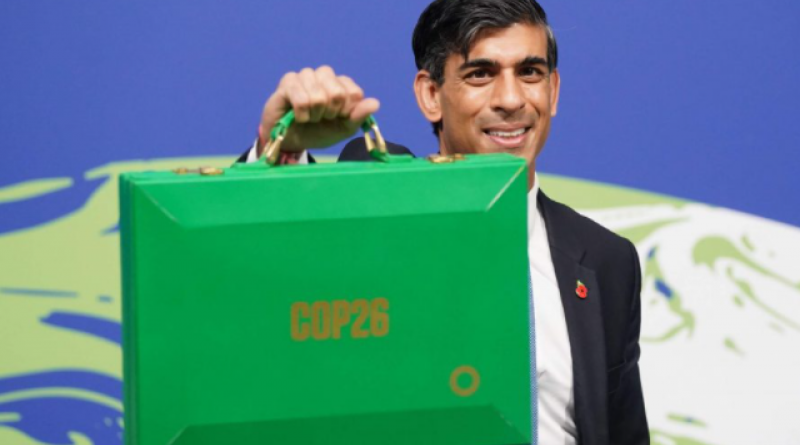How EXXONMOBIL Captured COP26

The Government, which is hosting the COP26 UN climate summit in Glasgow, is being formally advised by Texas fossil fuel giant ExxonMobil – one of the world’s biggest funders of climate science denial – according to Government documents examined exclusively by Byline Times.
The documents, unnoticed until now, reveal that Government officials have met with ExxonMobil representatives a total of at least nine times since 2020 to discuss UK climate strategy, net zero, decarbonisation and even Brexit – shaping both Britain’s own net zero plan, and how it has framed discussions at COP26.
Top Government ministers and officials have met repeatedly not just with ExxonMobil representatives but also with other oil industry officials over the past five years to explore key issues around Britain’s net zero climate strategy, associated energy policies, and in particular the role of carbon capture, utilisation and storage, the documents reveal.
The meetings, particularly those involving ExxonMobil, increased in the run-up to COP26.
The meetings reveal how one of the world’s biggest funders of climate science denial, as well as other major carbon polluters, are now formally advising this year’s host of COP26 on how to achieve net zero. Perhaps most importantly, they have done so not by breaking the law, but by simply exploiting the extraordinary largesse provided to them by Boris Johnson’s Government.
With the fate of the world hanging in the balance, this investigation raises urgent questions about how the very industries most responsible for climate change have been able to use the institutions of British democracy to deface the global agenda on net zero with impunity.
COP26’s Elephant in the Room
Carbon, capture, utilisation and storage (CCUS) is a controversial technology that involves attempting to capture carbon emissions released while burning fossil fuels and then storing them underground. But energy analysts and scientists warn that its feasibility and scalability remain unproven.
The Government’s fascination with the technology is not difficult to understand – if it worked, it would allow coal, oil and gas industries to continue increasing production while decreasing their carbon footprint. However, there is little evidence that the technology would actually work or even if it is affordable. Despite the hype from the fossil fuel industries, actual CCUS construction targets and performance have “consistently fallen way short of the energy industry’s own targets,” writes Seb Kennedy, editor of the Energy Flux newsletter.
“Advocates continue to argue the case for ever-greater state subsidies and tax incentives while hoping for a different outcome, without presenting credible justification,” he points out. “Theoretical posturing about the emissions reductions potential of a technology that has repeatedly failed to prove its economic case will no longer do.”

According to Basav Sev, climate policy director at the Institute for Policy Studies in Washington DC: “Carbon capture is an unproven technology, and there’s no certainty it will ever be economically feasible. It is downright dangerous to pin our hopes on such a speculative technology to address the dire climate emergency humanity already faces.”
Despite this, CCUS is a major component of net zero plans for many of the world’s fossil fuel producers – including Johnson’s net zero 2050 roadmap, published on the eve of COP26, which promises to back carbon capture with up to £1 billion.
A November 2020 report by Johnson’s finance advisor to COP26, former Bank of England Governor Mark Carney, claims that “almost $50-135 billion per year will need to flow to carbon capture” as well as to biofuel technology in order to “transition to net zero.” That highly conservative estimate is in addition to already existing $6 trillion a year fossil fuel subsidies.
The Exxon Plan
The emphasis on carbon capture as a solution, despite the lack of evidence and the tremendous cost implications, is not coming from governments but from the fossil fuel industries which have most to lose from rapid climate action.
Earlier this year, Kate Aronoff of The New Republic described how extensive lobbying by ExxonMobil officials around carbon capture and other ideas was heavily influencing Joe Biden’s climate policies and infrastructure package. So much so that the resulting bipartisan deal – stripping back investment in renewables – has been dubbed ‘the Exxon plan’.
Her report built on revelations from Greenpeace’s Unearthed investigative unit showing that a top ExxonMobil lobbyist, Keith McCoy, had boasted to an undercover reporter about the firm’s lobbying for carbon capture subsidies. He also admitted that the oil giant had aggressively funded climate science denial. But now, McCoy had let on, ExxonMobil hopes to use CCUS to open up a whole new revenue stream creating “a new pathway for the corporation” – one in which oil and gas production can continue at pace.
After McCoy was outed by Unearthed, he stopped working for ExxonMobil. The firm’s CEO denied that McCoy’s statements represent the company’s actual positions.
Despite knowing of climate change as early as 1981, ExxonMobil has funded climate science denial for more than 30 years to the tune of more than $30 million, and has continued to do so despite publicly acknowledging that the “risk” of climate change is real.
Despite this, Government data and documents seen by Byline Times reveal that, in the run-up to COP26, ExxonMobil successfully turned its lobbying efforts to Britain.
The ExxonMobil Meetings
ExxonMobil representatives have not only met nine times – at least – with senior British Government ministers to advise them on the UK’s energy policies in relation to net zero, they have done so as part of various formal Government advisory structures through which fossil fuel companies intimately shape the Government’s net zero plans.
Some early meetings took place in the form of private dinners and informal discussions. Channel 4, for instance, reported on a meeting between representatives of ExxonMobil, Shell, BP, Chevron and Equinor and the then Trade Minister Conor Burns in February 2020. The firms wanted to discuss how they would “work with the UK, including during our leadership of COP26” – and they wanted Government support to be “seen as a vital part of the solution to future energy provision” according to a Government memo about the meeting.
The Government has denied being lobbied at this meeting, describing it as “a routine engagement with the energy industry focussed on the importance of the transition to a clean energy future”. The companies present similarly denied anything untoward was going on. Since then, the public has remained in the dark about what exactly happened next – until now.
Byline Times can exclusively reveal that, just four months after this meeting, ExxonMobil became part of a formal advisory structure to the Government’s efforts to integrate carbon capture into its net zero strategy. The relationship shows how the most carbon polluting fossil industries in the world have become integral to the Government’s net zero deliberations, allowing them to circumvent traditional cumbersome lobbying mechanisms.
The first major formal Government engagement involving ExxonMobil relating to net zero occurred in July 2020 – when Mike Cooper, ExxonMobil’s then lead country manager for the UK, attended a meeting with UK ministers, civil servants and fossil fuel industry representatives at the Government’s CCUS Council.
Launched by the Government in 2018, the CCUS Council was set-up to “support the Government’s ambition to deploy CCUS from the mid-2020s and at scale during the 2030s and review progress”, according to a Government ‘terms of reference’ document for the group. “This is essential to the UK achieving its world-leading commitment to net zero by 2050.”
After joining the Government-hosted meetings in July 2020, ExxonMobil became a regular fixture at other meetings to determine how CCUS would fit into the UK’s net zero strategy.
The meetings were co-chaired by the Energy and Clean Growth Minister, and James Smith, former chair of UK oil giant Shell, who later become a major voice promoting CCUS as a solution in the environment movement.
Back in 2012, Smith had demanded Government support for CCUS, claiming that “like it or not, relatively cheap coal and gas will be the major fuels for the next few decades in generating electricity”. The former Shell boss was wrong: Demand for coal peaked a year later and the industry is now going bankrupt (and of course gas prices are now spiking). But support from the Government for Smith’s carbon capture pipe dream came anyway.
Paul Greenwood, ExxonMobil’s current lead country manager for the UK, is now identified by the Department of Business, Energy and Industrial Strategy (BEIS) as a member of the Government’s CCUS Council, and is thus formally advising the Government on a long-term rather than merely ad hoc basis.
Archived versions of Government webpages reveal that, whereas in 2019, ExxonMobil was not involved in the CCUS Council, the company became part of this formal advisory structure to the Government in January 2021 at latest – along with BP, Shell and Equinor, which had all attended the private dinner with Conor Burns in February 2020.
The CCUS Council last met in July 2021, when it was co-chaired by Smith and Anne-Marie Trevelyan as Minister of State for Business, Energy and Clean Growth. Minutes of that meeting refer to Kwasi Kwarteng, then BEIS Secretary, and Trevelyan, reinforcing “the importance of building back better whilst CCUS being at the centre of it all”. The goal of the meeting was to ensure “effective commercial frameworks were put in place to encourage CCUS market to grow”.
Trevelyan is now International Trade Secretary. As Byline Times has previously reported, Department for International Trade country Exporting guides show that, despite Boris Johnson’s pledge to end support for foreign fossil fuel investments in December 2020, the Government continues to actively encourage UK businesses to profit from oil and gas projects in countries like Saudi Arabia, Norway, Brazil and Argentina.
Meanwhile, since 2018, the Government’s CCUS Council has held 10 meetings in total involving major oil and gas industry representatives. ExxonMobil has participated in the most recent four since 2020, up to the summer of 2021.
When Exxon Met Anne-Marie
Government ministers involved in the designing of the net zero strategy also met many other times with ExxonMobil, along with other fossil fuel energy companies, outside of these CCUS meetings.
Data on ministerial meetings published by BEIS examined by Byline Times shows that as BEIS Minister, Anne-Marie Trevelyan met with ExxonMobil and other oil giants, three times in early 2021 – all to discuss issues relating to the development of the net zero strategy.
On 18 January, she met ExxonMobil as well as groups including oil giant BP, the Carbon Capture and Storage Association, and the UK’s industry body Oil and Gas UK to get advice on the Government’s Energy White Paper.
She met again with ExxonMobil on 11 March to discuss CCUS. Others at this meeting included BP, Shell, Norway’s state-owned oil company Equinor, French multinational investment bank Societe Generale, OCGI Climate Investments – an oil and gas industry group focusing on carbon capture type solutions, Italian oil supermajor Eni, and Anglo-American mining and petroleum giant BHP, among several CCUS-linked industry associations.
Her third meeting with ExxonMobil occurred on 24 March as part of the Government’s Industrial Energy Stakeholder Forum “to discuss industrial decarbonisation”. A wide range of companies from British industry also attended including other oil and gas groups such as BP, Equinor, Oil and Gas UK, and the UK Petroleum Industry Association.
Newly released Government data published last month confirms that Trevelyan then had a fourth meeting with ExxonMobil on 25 June alongside BP, Shell, Equinor, Total, North Sea oil firm Harbour Energy, and Texas oil giant Phillip 66.
The then Cabinet Office Minister Michael Gove also met with ExxonMobil on 18 January 2021, as part of his regular meetings with the Brexit Business Taskforce. Exxon was joined by one other energy company, the chemical and gas fracking firm INEOS, along with several other industry groups.
Friends with Benefits
This lobbying appears to have accompanied handsome dividends for an industry with mounting economic woes.
Thanks to a UK tax policy allowing fossil fuel firms to claim back public money for decommissioning oil rigs and infrastructure, ExxonMobil, Shell and BP are paying negative tax on North Sea operations, meaning that they are being paid hundreds of millions of pounds by HMRC.
ExxonMobil could be in pole position to profit from the emphasis on CCUS in the Government’s net zero plan. Following ExxonMobil’s sequence of meetings with Government ministers and UK industry leaders, the Texas oil giant signed a memorandum of understanding in July 2021 with Shell and Harbour Energy for the Acorn CCUS project at the St Fergus gas complex in Peterhead, Scotland.
Acorn is one of five proposed CCUS projects that have passed the Government’s eligibility test. Other bidders for these projects included the same fossil fuel giants which have spent the past two years shaping the very strategy they bid for, such as Eni, BP, Equinor, Shell and TotalEnergies.
Although on the eve of COP26 the Scottish project was relegated to ‘reserve’ status, the Government has said that Acorn will be developed in the next few years in the second phase of the UK’s carbon capture roll-out. Fossil fuel companies immediately benefiting from the greenlighted projects in Liverpool and Humber are, like ExxonMobil, formally advising the Government as part of its CCUS Council: BP, Equinor, Drax, Eni and Progressive Energy.
Byline Times asked some of the companies involved about these cosy relations.
In a statement, a spokesperson for BP told Byline Times that as “a major business headquartered in the UK, with significant interests and plans in the country” – including for offshore wind, CCUS, hydrogen production and electric vehicle charging, “we regularly speak with government officials… We strongly support the UK’s ambition for the COP26 meeting. We believe CCUS can play a vital role in limiting emissions, helping us achieve our net zero aims and supporting global efforts to meet the Paris goals.”
A spokesperson for Equinor similarly said that the firm regularly communicates its views on climate policy “in dialogues with ministers and other stakeholders” and that it “urges governments to include measures that incentivise the demonstration and deployment of CCS in both industrial and power generation applications as part of their updated National Determined Contributions (NDCs),” including “explicit milestones for CCS deployment over the medium term, with a defined CCS capacity target for 2030.”
Shell declined to comment.
In a statement, ExxonMobil said that they have “long acknowledged that climate change is real and poses serious risks,” noting the firm’s support for the Paris Agreement. “We believe that climate change risks warrant action and it’s going to take all of us — business, governments and consumers — to make meaningful progress.” The statement said that both the International Energy Agency (IEA) and the UN Intergovernmental Panel on Climate Change (IPCC) “consider carbon capture and storage to be critical to achieving society’s ambition for net-zero emissions” and went on to say: “Our public statements about climate change are, and have been, truthful, fact-based, transparent, and consistent with the views of the broader, mainstream scientific community at the time. And as the scientific community’s understanding of climate change developed, we have responded accordingly.”
In reality, while the IPCC has recognized a potential role for CCUS, it has said that the emissions reduction pathway with the best chance of keeping warming at or below 1.5°C makes limited to no use of engineered carbon capture technologies. The most effective pathway to net zero, in this scenario, is a rapid fossil fuel phaseout along with carbon withdrawal based on reforestation and soil carbon uptake.
It is difficult to avoid the conclusion that the world’s biggest carbon polluters are hijacking the net zero narrative to stem their losses and maximise profits on the back of taxpayer cash. But the technological solution they are offering has little independent scientific backing.
While UK ministers were courting ExxonMobil and other carbon polluters earlier in the summer, the Washington-based Center for International Environmental Law published a damning analysis concluding that “the unproven scalability of CCS technologies and their prohibitive costs mean they cannot play any significant role in the rapid reduction of global emissions necessary to limit warming to 1.5°C… Despite the existence of the technology for decades and billions of dollars in government subsidies to date, deployment of CCS at scale still faces insurmountable challenges of feasibility, effectiveness, and expense”.
The alarming implication is that Britain’s own net zero plan is a deeply flawed strategy shaped by the concerted lobbying of one of the world’s largest carbon polluters and funders of climate science denial: ExxonMobil.
“These claims are absurd. We make no apology for meeting major energy producers and suppliers during a global pandemic,” a Government spokesperson at BEIS told Byline Times. “This is even more important as we work towards what must be a shared endeavour of decarbonising industry and ensuring we end our contribution to climate change by 2050. Carbon capture will have a key role to play as we move towards net zero, as recognised by various independent bodies, including the Committee on Climate Change. The CCUS Council is made up of a range of members, including environmental groups, such as Green Alliance.”
Green Alliance – the only ostensibly environmental group in the Government’s CCUS Council – published its first report on the issue in 2008. Optimistically titled A last chance for coal, the report advocated CCUS as a way of saving coal and other fossil fuels, while also saving the climate. In reality, the coal industry is well on its way to bankruptcy and collapse.
As the host of COP26, Britain is actively pushing this flawed strategy as a baseline that fossil fuel producers all over the world should aspire to. UK allies such as the US, Saudi Arabia and Norway are promoting CCUS as the big net zero game-changer that can permit maximum exploitation of fossil fuels.
Yet is an approach that will be deeply attractive to ExxonMobil’s fellow fossil fuel firms and their financial backers, who fear that decisive climate action is a threat to their bottom lines, if not their very existence.
And it is. The problem is that the best available science suggests it’s either them – or all of us.
3 November 2021
BYLINE TIMES




